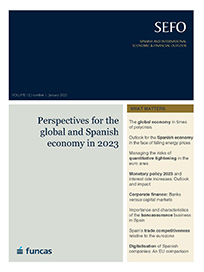Perspectives for the global and Spanish economy in 2023
Fecha: enero 2023
SEFO, Spanish and International Economic & Financial Outlook, V. 12 N.º 1 (January 2023)
Index
2022 was characterised by uncertainty, economic and financial markets volatility, and most importantly, an acceleration in the regime shift in which the global economy is immersed. Although many questions remain unanswered, 2023 should shed some more light on key future international economic trends, with the search for a new equilibrium in prices, economic policy and geopolitics the main variables to watch.
The combination of labour market resilience and an easing of inflationary pressures arising from lower energy prices, coupled with higher than anticipated natural gas storage levels in Europe, means that the economy is likely to perform better than initially thought. Albeit economic uncertainty weighs heavily on forecasting, in 2024, the Spanish economy is expected to reach pre-pandemic growth levels, with fiscal indicators improving in tandem with recovery; however, fiscal sustainability will depend on the credibility of the targets set for correcting current imbalances and the transformational nature of the investments financed using the NGEU funds.
Recent quantitative tightening decisions undertaken by the ECB are important to reduce surplus liquidity and improve the functioning of the monetary transmission mechanism in the euro area. Nevertheless, they pose important risks for commercial banks, central banks, government finances, and the ECB itself.
The monetary policy roadmap for 2023 will continue to prioritize the fight against inflation, with successive official rate increases at least for much of the year, although accompanied by a slower increase in EURIBOR. Within this context, the banks will continue to play a key role in credit provision to the economy, yet while they could face improved income prospects, notable challenges exist within the prevailing uncertain climate.
Tension in the corporate bond market since the start of the inflationary spiral towards the end of last year has driven a sharp increase in secondary market rates, as well as a sharp contraction in primary market issuance, forcing many corporates back to the bank financing channel they had previously abandoned. Nonetheless, rather than seeing this development as a setback, it reflects the complimentary rather than substitutive nature of bank and market corporate financing, with the banks acting as a back-up option when the bond markets are temporarily unable to finance the productive apparatus.
The weight of bancassurance in Spain´s insurance business and its contribution to parent banks’ domestic earnings are very significant. As a result, as evidenced by the recent COVID-19 crisis, as well as in normal times, the relatively substantial contribution of the bancassurance business lends earnings stability and solidity to the banks with the most developed such businesses.
Spanish exports registered nominal growth of 40% between 2012 and 2021, the highest rate among the euro area’s five largest economies. While the Spanish economy is capable of improving its internal cost competitiveness and transforming those gains into export growth, Spain’s export intensity remains below its weight as an economy within the universe of benchmark economies.
In contrast to the Spanish economy’s relatively low productivity levels, overall, Spanish companies are relatively highly digitalised. However, a high percentage of Spanish companies use digital technology to control worker performance (relative to alternative uses in companies in more productive countries) and have relatively low levels of organisational capital (complementary to digital capital).

